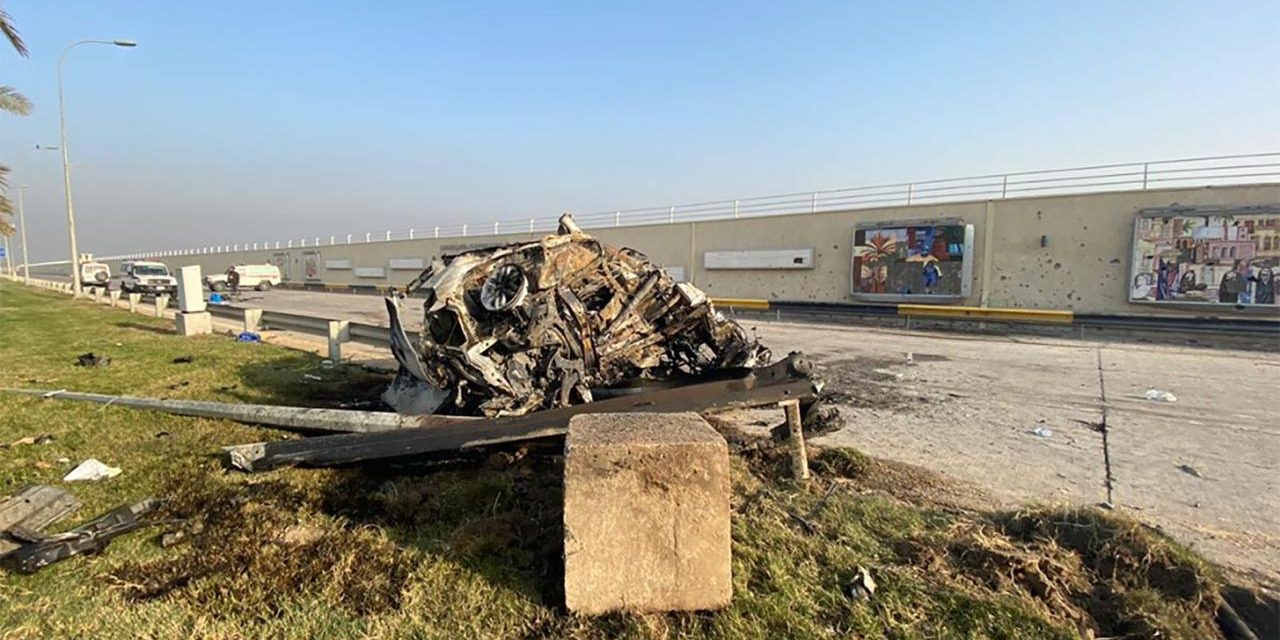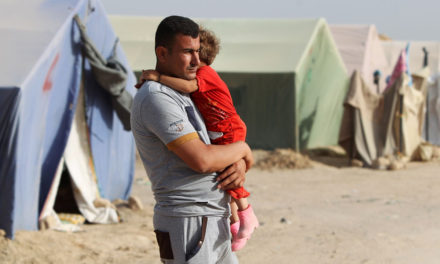(Photo: CNN)
The U.S. assassination of Qassim Suleimani and Abu Mahdi Al-Muhandis near Baghdad International Airport sparked a global crisis with dangerous implications on local, regional, and international security. The question begs itself as to how to interpret the move by the U.S. and what consequences it will have on the situation in Iraq?
President Donald Trump said he decided to assassinate Qassim Suleimani under pressure from individual GOP members who will play an influential role in his impeachment senate trial. Nevertheless, the U.S. must have known that this decision will have significant repercussions, and therefore, the U.S. would not have engaged lightly in a move that would disrupt the balance of a cold war it has been waging against Iran throughout the region.
At the same time, the U.S. realizes that the death of a popular figure like Suleimani would not mean the end of the IRGC, nor would it stop it from pursuing its announced goal of forcing U.S. withdrawal from the region. The U.S. also knows Iran’s military capacity all too well, and logic suggests that it would not risk being hit by Iranian missiles in order to look bad in front of the world, considering that this is something it wouldn’t allow superpowers like China and Russia to ever take advantage of.
Nevertheless, the U.S. followed through with it. Certainly, revenge seems to have played a vital role in the decision. After all, Suleimani was a top commander in Iran’s Revolutionary Guard, and everyone agrees that he was the mastermind of all anti-U.S. effort in the region. However, going through with assassinating Qassim Suleimani in Baghdad and risking the huge backslash, knowing that this move is less effective on a strategic level and more of an angry response to counter the massive and well-calculated pressure from Iran to force the U.S. gradually out of the region, suggests that the U.S. was running out of moves and desperately looking for a way out. Many are of the opinion that it made things worse for the U.S. and the world.
What that means for the Government of Iraq is that the U.S. won’t be playing along with the balancing act that has been governing the situation in Iraq when it comes to Iran anymore. As a result, Iraqis watched how, with one act, the carefully calibrated equilibrium they have been keeping for years to avoid slipping into a looming regional conflict was disrupted.
The last couple of weeks showed that the U.S. is actively willing to face-off with Iran and Iran’s allies in Iraq. While bombing Kataeb Hizbollah’s headquarters in Anbar might have been the announcement that this new phase has started, the assassination of Suleimani and Al-Muhandis showed the extent it is willing to go.
Today, Trump is openly threatening Iraqis with sanctions if they ask the U.S. to withdraw its forces from Iraq. In response to the request of the caretaker Prime Minister Adil Abd Al-Mahdi to have visiting U.S. delegations to discuss the troop withdrawal as requested by the Iraqi parliament, the State Department responded it is willing to negotiate its partnership with Iraq, but not its troops withdrawal.
All these stances signal the desperation of the U.S. to stay in Iraq. It not only shows disregard to the will of the Iraqi people and the fact that the U.S. caused through its embargo in the 1990s the death of half a million Iraqi children. More importantly, it speaks volumes about why the U.S. is still in Iraq, and the main reason is indeed not fighting Daesh.
Especially with Trump as President, the U.S. approach in Iraq is getting closer to, ‘either with me against Iran, or else…’ as opposed to ‘friends with U.S. and friends with Iran,’ or any other version of neutral stances that were common in Iraqi politics before the U.S. strike. Regardless of U.S. justifications and motives, its move angered and earned the disapproval of many people in Iraq as it begged for strong reactions, and so they came.
Iraqis still remember Suleimani as being the first to respond to their call for support when the U.S. was watching ISIS advance towards Baghdad and Erbil and contemplating whether it wanted to be involved or not. Through the public diplomacy campaign, he was religiously engaged in and which no U.S. official could imitate, and through his vast network of political leaders, Suleimani’s influence was unmatched in the region. As for Al-Muhandis, Iraqis were used to seeing him on the front lines fighting Daesh alongside Iraq’s other military commanders, although he was the deputy head of the Popular Mobilization Forces. He also yielded significant influence within the political elite, and friends and foes respected him.
Apart from his popularity, Suleimani was a foreign military commander who, according to Iraq’s caretaker Prime Minister, was on a diplomatic mission in Iraq. Al-Muhandis, on the other hand, was, apart from his politics, an official in Iraq’s armed forces who was received by the former. The U.S., taking both out on Iraqi soil, signaled to the Iraqis utter disregard of international law and mutual agreements, and indifference towards Iraq’s sovereignty.
Even on a cultural level, attacking a guest, whether friend or foe, is seen as something disgraceful, especially when the guest’s mission was supposedly one that would prevent the region from more conflict. Assassinating a guest by a third party is even more problematic, and killing an Iraqi official on top of that peaks treacherous behaviour in Iraq’s dominantly tribal culture.
Therefore, while Iraqis are divided on many issues, even the future of the U.S. presence in Iraq, they found themselves united in condemning the stark violation and disrespect of Iraqi sovereignty and the disregard of the U.S. to the already fragile situation in their country. The caretaker Prime Minister, the President, and the Speaker used strong language in condemning the move, regarding both men as ”martyrs” and ”heroes of liberation.“ The leaders of most political parties in Iraq joined them in their condemnation.
The U.S. actions pushed also many buttons in Najaf. Few might have noticed, but the Mar’jeia not only voiced its discontent in powerful language, it also concluded, for the first time, the Friday Sermon with a prayer Shia use before going to war. This is unprecedented as the Mar’jeia did not do such a thing even after announcing its famous fatwa to combat Daesh.
Thousands joined the funeral of Suleimani and Muhandis, as they turned into demonstrations against the U.S., filling the streets of Kadhmiya, Najaf, and Karbala, with Iranian flags waved along with Iraqi ones. Grand Ayatollah Sistani sent a condolence letter to Ayatollah Khamenei, and the media covered how his son and two representatives prayed in the funeral. Two other Grand Ayatollahs personally took part in the ceremony, something rarely seen in Najaf. In Iran, hundreds of thousands attended the ceremony organized for Suleimani and Muhandis in Mashhad, Tehran, and Qom with Iranians this time waving Iraqi flags along with Iranian flags. Ayatollah Khamenei and practically all of Iran’s leadership joined the prayers in Suleimani and Muhandis’ funeral.
After watching the massive funerals, Iraq’s political elite must have realized the bitter truth that if any of them died, they would not be mourned the same way these two men were. One reason amongst many is that at the centre of this global crisis, Iraq suffers from a turmoil and is being led in caretaker mode in a time when leadership is required the most. Iraq’s hope at this moment is, as meager as the outlook, the maneuvering skills of its leaders, this time to save the country from a political crisis and not only to achieve their political ambitions. As for the future, foreign influence needs to be taken seriously and dealt with more thoroughly.
The ‘drones and sanctions’ policy the U.S. is pursuing today in Iraq will only further reinforces the notion that America is not a trustworthy partner, and regardless of the stances of the political elite in Iraq, these actions only earn it more enmity amongst the Iraqi people who have already suffered from its dismissive policies in the past. Very importantly, the warning in the Mar’jeia’s tone should not be taken lightly by U.S. decision-makers.

Muhammad Al-Waeli
Muhammad Al-Waeli is a Ph.D. candidate in management focusing on leadership and reform in Iraq.










